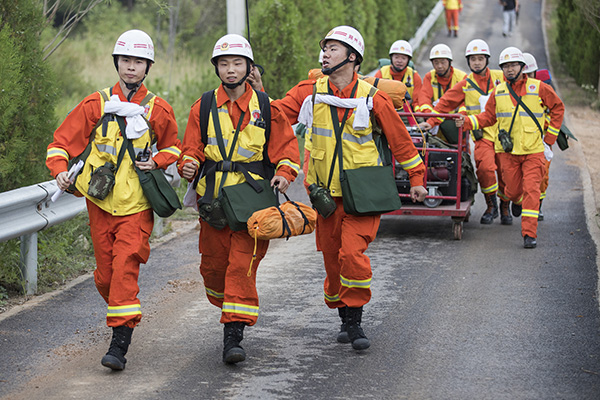China proposes abolition of work safety body
13 March 2018As part of a wide-ranging reform of China’s government and administrative structure unveiled today at the National People’s Congress in Beijing, the government has proposed getting rid of the State Administration of Work Safety (SAWS) and merging its functions into a new national Emergency Management Department.
The new department, under the State Council, will also absorb the disaster management responsibilities currently under the Ministries of Civil Affairs, Agriculture, Water Resources, Land and Resources, as well the departments responsible for earthquake, drought and flood relief.
The rationale for the new department is to provide an efficient and coordinated response to a broad range of disasters from forest fires to coal mine explosions but it appears to eliminate the role of SAWS in ensuring a safe working environment.

Firefighters in Shanxi during a practice earthquake rescue.
The move seems to confirm the suspicion that, on the issue of work safety, the Chinese government is more concerned with disaster management and control rather than in preventing workplace accidents in the first place.
As we pointed out in our background article on work safety, SAWS and its local affiliates had never been very proactive in their approach to workplace inspections and had limited power to actually enforce China’s extensive work safety legislation. Nevertheless, simply getting rid of SAWS is not going to solve anything.
Details of the new Emergency Management Department are still vague and it is possible that it will include work safety inspection in its remit. If this is the case, it is essential that the new body does not simply emulate SAWS reactive and coercive approach to work safety but adopts a much more pro-active and constructive strategy that sees the government work with business owners and employees to make sure the workplace and work practices are as safe as possible.
CLB’s Work Accident Map has clearly demonstrated that major disasters only make up a tiny proportion of work accidents in China. The vast majority of accidents involve just a handful of workers and are usually related to the failure of the employer to provide basic safety equipment and training for employees.
If work safety is to really improve in China, there has to be a fundamental change in labour relations in the workplace in order to prevent employers from forcing employees to work in a dangerous environment and to ensure that workers are properly cared for and compensated when accidents do occur.
In particular, if SAWS really is on the way out, it is more important than ever that the trade union fills the void and plays a far more constructive role in work safety. Union officials should ensure that employees are properly trained and have the safety equipment they need to perform their assigned tasks. They should encourage workers to raise safety concerns and protect whistle-blowers from management reprisals. Once hazards are detected, the trade union should act immediately to rectify the situation, and demand that production be shut down, if necessary, in accordance with the law.
